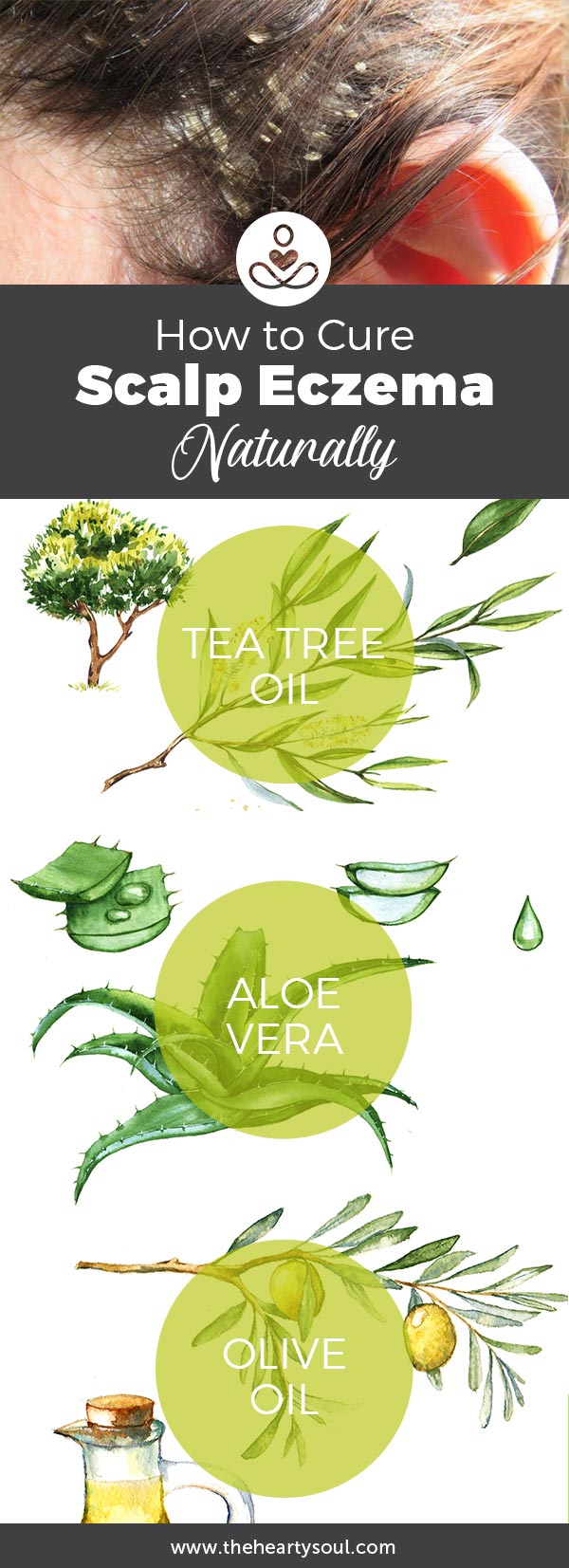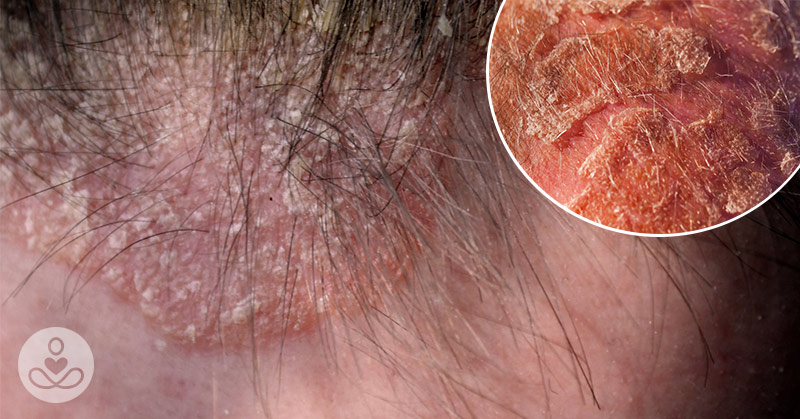If you’re seeing white skin flakes come off your head, there’s a good chance it’s probably scalp eczema. It is a stubborn condition that persists for years, and can come and go without warning. Symptoms of scalp eczema can be effectively managed, but the condition cannot be cured completely.1 Lets take a look at the risk factors linked to scalp eczema, how to help prevent it, and what to do about it when it occurs.
Triggers and Symptoms
No one knows what causes scalp eczema, but it affects up to 5 percent of the general population. Affecting slightly more men than women, it can be triggered by genes, hormones, illness, and stress. Those with weakened immune systems, preexisting skin conditions, asthma, and other eczema types are more prone to scalp eczema.
Additionally, if you’re struggling with stress levels, a lack of sleep, excess sweating (stay clean after a workout!), dry skin, or have particularly greasy hair, you’re more likely to get it, too. Flare-ups can be prevented by reducing stress and avoiding exposure to suspected irritants. Irritants, including hair dye, harsh soap, and very hot water, can affect people differently. Gentle shampoo and warm water can help keep the scalp clean.
Once triggered, scalp eczema can worsen by a combination of otherwise normal skin properties. Naturally occurring oil called sebum, yeast that lives on the skin, and a skin fungus called Malassezia, both play a role.
Sebum is a waxy, fatty substance that is expelled by your sebaceous glands (in your hair follicles). Too much of this substance can create a greasy, scaly environment to develop on the scalp, leading to an overgrowth of the (usually harmless) Malassezia. When this fungus starts to irritate the sebaceous glands, the body creates a distinctive scaly rash – dandruff, which is a symptom of scalp eczema.2
This form of eczema can also affect other oily areas of the body, such as the face, nose, eyebrows, eyelids, and ear canals. When it does, it may result in greasy, waxy, or even blistered skin, or for the ear a discharge of fluid. When the patches of skin become infected, they release a clear fluid and change in color, possibly staying that way even after healing.
Medical Treatments for Scalp Eczema
Although scalp eczema cannot be cured, medical treatment can bring relief by removing the scaly buildup and reducing itchiness. Treatments usually come in the form of a shampoo, cream, or gel to apply to the scalp.3 Shampoos that are most effective against scalp eczema include those that contain one or more of the following ingredients:
- zinc pyrithione
- salicylic acid
- selenium sulfide
- ketoconazole
- coal tar
Antifungal creams, ointments, or sprays can also be effective in mild cases. Typically, these contain coal tar or corticosteroids that help calm the irritation and stop the flaking. A mild corticosteroid can calm the inflammation even in more severe cases. Doctors may prescribe topical corticosteroids to treat an active flare-up, but they are not suitable for use over long periods. Non-corticosteroid medicines may be used to suppress the immune system’s calcineurin (a protein phosphate) inhibitors, which can be used for a more extended period than corticosteroids. In very severe cases, a doctor may prescribe an oral antifungal medication.4
Read More: Psoriasis and Eczema Sufferer Created Diet That ‘Cured Her’ and is Helping Thousands of Sufferers
Natural and Over the Counter Remedies for Scalp Eczema
Anecdotally, natural remedies have helped relieve the symptoms of scalp eczema in some people. There is no single test for decisively diagnosing scalp eczema. This is because the yeasts and fungus that play a role in scalp eczema occur naturally on the scalp of everyone. The doctor may take a skin scraping to determine whether a fungal infection is also present. Rarely, a small sample may be required to rule out the other conditions that resemble scalp eczema. While it is always advised to seek a medical professional, here are some natural options you can also explore:
1. Apple Cider Vinegar
Apple cider vinegar, known for its antioxidant and antimicrobial properties, can be an effective remedy for an itchy scalp. The National Psoriasis Foundation recommends using a diluted solution of water and organic apple cider vinegar several times a week. After application, make sure to rinse your scalp thoroughly.
2. Organic Coconut Oil
Organic coconut oil contains antifungal and antibacterial properties that may help soothe an itchy scalp. Its high content of lauric acid allows for efficient absorption into the skin, providing relief. Additionally, a combination of coconut oil and anise has shown promising results in combating scalp itch caused by head lice.
3. Peppermint Oil
Peppermint oil has been found to significantly reduce symptoms of itchiness when applied to affected areas of the scalp. Dilute peppermint oil with water or another carrier oil and massage it into the scalp before shampooing for best results.
4. Meditation
Reducing your stress levels through meditation can also help alleviate itchy scalp symptoms. Research suggests that meditation and guided imagery can improve symptoms of psoriasis, a common cause of scalp pruritus. Incorporating meditation into your daily routine may complement other medical treatments.
5. Tea Tree Oil
Tea tree oil, known for its antimicrobial and anti-inflammatory properties, may provide relief for an itchy scalp. However, it’s essential to use tea tree oil sparingly or dilute it before application to avoid skin irritation. Consider adding a few drops to your shampoo or mixing it with a carrier oil like olive oil for scalp massage.
6. Zinc Pyrithione Shampoo
Zinc pyrithione shampoo is an over-the-counter treatment for skin conditions like psoriasis and seborrheic dermatitis. It’s essential to consult with a healthcare professional before using these shampoos, as the concentration of zinc pyrithione varies among brands. Adjust the frequency of shampooing based on your condition and scalp sensitivity.
7. Salicylic Acid
Shampoos containing salicylic acid, a beta hydroxy acid with anti-inflammatory and antibacterial properties, may help alleviate itchy scalp symptoms. Be sure to read the labels and follow usage instructions carefully, as the strength of salicylic acid formulations may differ. Avoid using salicylic acid if you have an allergy or sensitivity to aspirin.
8. Ketoconazole Shampoo
Ketoconazole shampoo, available over the counter or as a prescription medication, is effective at reducing scalp infections caused by yeast. These shampoos typically provide relief within a few weeks and can be used regularly to prevent the recurrence of scalp conditions like dandruff. However, consult with a healthcare professional before use to avoid potential side effects.
Scalp eczema can cause extreme discomfort, anxiety, and infected skin. When any of these things happen, or if scalp eczema persists despite home treatment, it is usually time to see a doctor.
Read More: Do Apple Cider Vinegar Baths Help Eczema?
Disclaimer: This information is not intended to be a substitute for professional medical advice, diagnosis or treatment and is for information only. Always seek the advice of your physician or another qualified health provider with any questions about your medical condition and/or current medication. Do not disregard professional medical advice or delay seeking advice or treatment because of something you have read here.

Sources
- “What Is Scalp Eczema? Symptoms, Causes, Treatment, and More.” Everyday Health
- “Dandruff.” NHS
- “What is the best way to treat severe dandruff?” Harvard. May 1, 2017.
- “SEBORRHEIC DERMATITIS: OVERVIEW.” AAD
- “All About Scalp Eczema.” Healthline. Natalie Silver. June 26, 2023.

